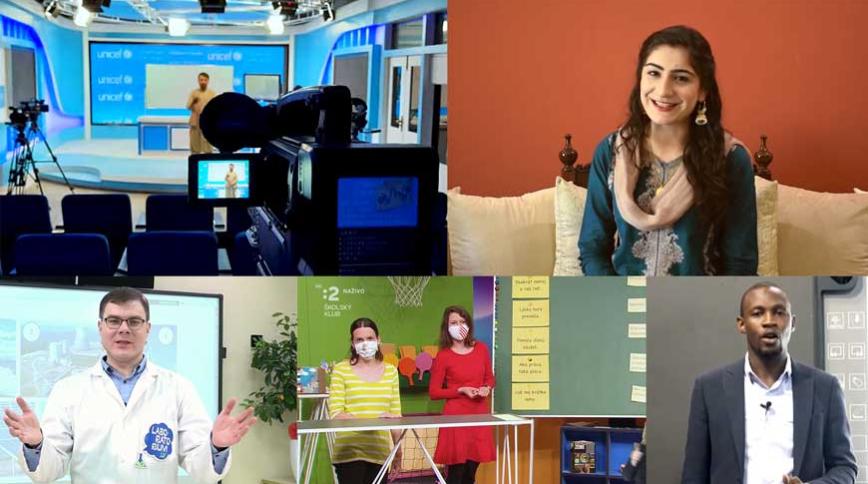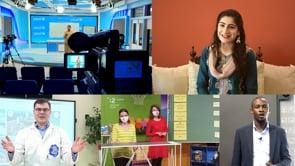Using Television to Reach Students While Schools are Closed

As teachers around the world grapple with the impacts of school closures as a result of the COVID-19 pandemic, Teach For All network partners and their participants and alumni are responding with creative and innovative solutions to continue reaching their students. While online learning has been the most common solution, access to internet connection varies from country to country and household to household. The global online penetration rate is still only 59%, and is much lower in countries across Southern Asia (48%) and Sub-Saharan Africa (~25%). The reality is that hundreds of millions of students do not have access to online learning, and one of the strategies teachers across our global network are using to bridge this gap is broadcasting their lessons on TV.
In Latvia, Iespējamā Misija alumnus Mārtiņš Gulbis, the founder and CEO of Laboratorium, a science education initiative, is working with the Latvian national government to host daily 20-minute science lessons for grades one to four that are aired on television and online, where they’ve been accessed by over 200,000 viewers in over 50 countries. Mārtiņš focuses on designing lessons with materials that kids are likely to have access to in their homes. Similarly, Teach For Afghanistan alumnus Gulbadin Saqib is developing and delivering science lessons that are broadcast on two TV channels in Nangarhar, and also working on revising and standardizing the school curriculum to meet the needs of the current situation in his role on the advisory board of the Nangarhar Education Directorate. Teach For Pakistan alumna Marriam Musa is hosting a show for The Citizens’ Foundation that is being broadcast on PTV’s Teleschool, a dedicated education TV channel available across Pakistan that was recently launched by the national government.
Teach For Slovakia is collaborating with a local NGO to create content for the TV show “Školský Klub” (School Club), which is broadcast every day on RTVS, the national public television network. The show consists of 90-minute daily lessons on various subjects, with the first 45 minutes targeted at younger students and the next 45 at middle schoolers. Teach for Slovakia participants and alumni plan and present a weekly lesson on Slovak language and literature and Kristína Uhlíková, a Teach For Slovakia staff member who’s helping create content for the lessons, explained that this form of teaching can be “quite demanding as there are no kids in the studio and you have to be very creative in coming up with different activities without being able to see the kids’ reactions.” Teach For Slovakia alumnus Arnold Kiss stressed that their goal is to make the lessons as interactive as possible to keep students engaged and allow them to follow along. They even encourage children to send in photos of the work they completed which are shared on the show and on its website. Last week, RTVS launched a new show, “Tumenca Khere” (With You at Home), which Teach For Slovakia also helped develop. The show is presented in both Slovak and Romani and aims to extend the educational content of “Školský Klub” to children from Roma communities.
Fifteen Enseña Perú alumni are helping create the lesson plans for the Ministry of Education’s national “Aprendo en Casa” program, which offers learning experiences, tools and educational resources for students, families, and teachers. The alumni are helping to write the scripts for video lessons which are broadcast on national television and online.
In Lithuania, Renkuosi Mokyti! participants are working alongside well-known Lithuanians on LRT, the national Lithuanian television station, to teach children across the country by involving them in experiments and activities. LRT is free public television, so almost all children have the opportunity to engage in various lessons from their homes and students can also connect to the classes through the LRT app.
Teach For Nigeria participant Martin Odebowale is leading a group of nine other participants who are teaching live on TV in partnership with the Ogun state government and reaching millions of students. While developing their lessons, Martin explained that they focused on making them as interactive as possible, using electronic whiteboards and getting into character to act out the lessons because they “wanted students to feel like they’re with their teachers in their various classrooms.” The government has also launched a website to share the video lessons online, which enables students to interact with each other and their teachers on a forum and submit feedback on the lessons. According to Martin, the student feedback has been incredibly useful in helping the teachers revise and improve their instruction. Martin hopes the lessons are as strong as possible because, in his view, “the most important thing is for us to get out of COVID-19 lockdown better than when we entered into it.”
Recently, Martin met with other network alumni from Pakistan, Latvia, and Slovakia who are teaching on TV on a call facilitated by Teach For All’s Connectivity team. Since then, they have continued to communicate through a WhatsApp group focused sharing and adapting the lessons plans they develop for television. The WhatsApp group has continued to grow, and members regularly exchange lessons and ideas. If you’re an educator using television to deliver lessons to students and would like to join, please contact connect@teachforall.org.




